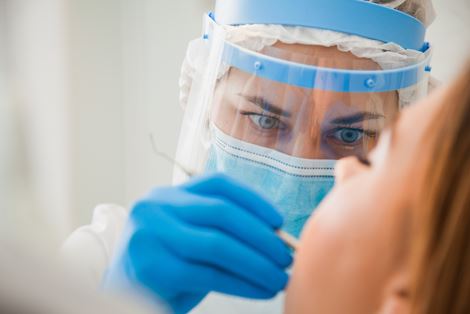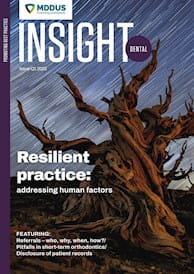 DENTAL teams continue to face unprecedented challenges during the pandemic – but could psychological science provide practical solutions?
DENTAL teams continue to face unprecedented challenges during the pandemic – but could psychological science provide practical solutions?
It may sound an unlikely source of help, but a new guide developed by the British Psychological Society (BPS) in partnership with dental leaders promises “straightforward suggestions to address common challenges arising from the Covid-19 pandemic in dental practices”.
The resource, Dentistry during Covid-19: Psychological advice for dental teams, policy makers, and communicators, has been published by the Faculty of General Dental Practice UK (FGDP) and College of General Dentistry (CGDent).
It covers six key challenges, offering evidence-based recommendations on “new ways of working informed by psychological science.”
Its advice ranges from the difficulties of cumbersome PPE and remote consultations, to managing patient expectations and team wellbeing.
1. PPE
The guide highlights the problems posed by additional personal protective equipment, from the physical discomfort for clinicians to difficulties in effectively communicating with patients. Preparation and habit formation, it says, are key.
It suggests:
- consider adding a photo of the professional’s face to their name badge.
- “normalise” the experience by emphasising to patients that dentistry has always used PPE.
- make sure you have items to hand to minimise discomfort, such as deodorant, fresh water and a change of clothes.
- have a standard operating procedure for visits that explicitly includes frequent breaks.
2. Extended appointment times
As practices are forced to extend appointment times to allow for cleaning and disinfection, the guide highlights the financial implications of seeing fewer patients per day and the anxiety this may cause about the practice’s viability.
It suggests:
- focus on the things you can control, rather than what you can’t control.
- plan ahead to make the best use of time. Think about tasks that can be done between clinical appointments, such as video consultations, CPD or admin.
- make any goals “SMART” – specific, measurable, achievable, realistic and time-specific.
3. Reduced AGPs
Covid restrictions may mean practices use fewer aerosol-producing clinical instruments, such as drills and scalers. This could cause issues for some patients who expect these instruments to be used during treatment.
The guide suggests:
- use simple, clear language to tell patients about treatments.
- use examples and evidence to educate patients why these instruments are not always needed to achieve a satisfactory treatment outcome.
4. Virtual consultations
As online/remote consultations increase, the guide acknowledges concerns from dental teams that they will be less effective or that patients may be less likely to follow advice given remotely.
It suggests:
- focus on the positives of being able to speak to patients without the confines of PPE. Remote consultations, the advice says, can follow the same basic structure as those carried out face to face, “so you can use your pre-existing, well-practised skills”.
- find out what influences each patient’s behaviour and tailor advice accordingly.
5. Team wellbeing
Financial uncertainty, job insecurity, confusing guidance, fear of catching Covid – the guide flags a number of issues affecting the mental health of dental team members.
It suggests:
- take active steps to safeguard your mental health wellbeing, e.g. develop skills in managing and addressing difficult thoughts/feelings.
- focus on the things you can control, not on the things you can’t. seek support. The guide lists a number of resources and sources of professional support (similar resources are listed on the MDDUS member wellbeing information page.).
6. Unfamiliar operating procedures
As standard operating procedures change during the pandemic, the guide discusses how difficulties could arise where patients and staff are unfamiliar with (or unmotivated to follow) new ways of working – an issue that can compromise safety.
The guide suggests:
- make sure staff have the equipment and resources they need to do their work. Consider planning ahead for situations where such resources may not be available.
- create concern but not fear. The guide explains that “concern is healthy and may motivate action”, while “fear is a threat – a concern that you think is beyond your control.” It explains that concern has been found to motivate protective behaviours (e.g. hand washing), while fear may prompt people to deny the risk and avoid protective behaviours.
- offer advice and instruction on clear behavioural actions and their related outcomes. For example, the guide encourages teams to clearly specify behaviours (e.g. “wash your hands on arrival for as long as it takes to sing the verse of Happy Birthday twice”), and link this behaviour specifically to effectiveness (e.g. “hand washing significantly reduces risk of infection”.)
- use messaging that emphasises how “we” can keep each other safe, rather than how “you” can look after yourself. This emphasis is reportedly more effective.
- give clear advice to patients in advance of their appointment, and reinforce this on arrival.
- focus on team-building and providing appropriate leadership. Emphasise that “we” are coming together against a common threat. Remind the team of previous successes with difficult situations.
- positively reinforce key behaviours, e.g. using praise; thanks).
The advice has been published as an adjunct to Implications of Covid-19 for the safe management of general dental practice, the CGDent-FGDP guidance on dentistry during the pandemic, which recommends that dental practices appoint a wellbeing lead and are able to signpost to mental wellbeing services.
The guide’s co-author Dr Heather Buchanan of the University of Nottingham says: “We have developed our evidence-based recommendations as practical responses to the concerns of dental professionals, offering new ways of working informed by psychological science, and supporting patient adherence to safety measures and dental advice during the pandemic.”
Joanne Curran is associate editor at MDDUS
This page was correct at the time of publication. Any guidance is intended as general guidance for members only. If you are a member and need specific advice relating to your own circumstances, please contact one of our advisers.
Read more from this issue of Insight Dental

Save this article
Save this article to a list of favourite articles which members can access in their account.
Save to library